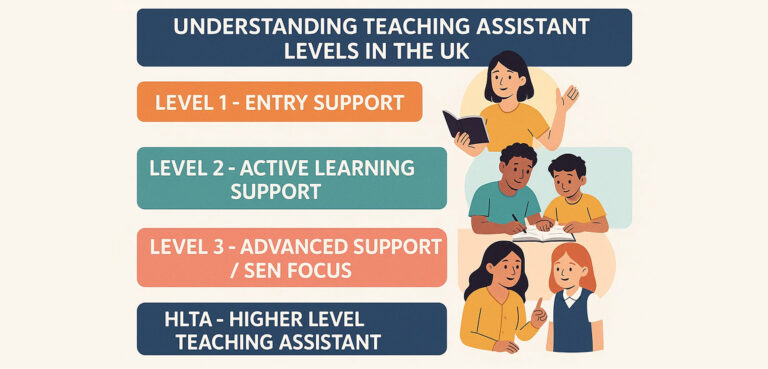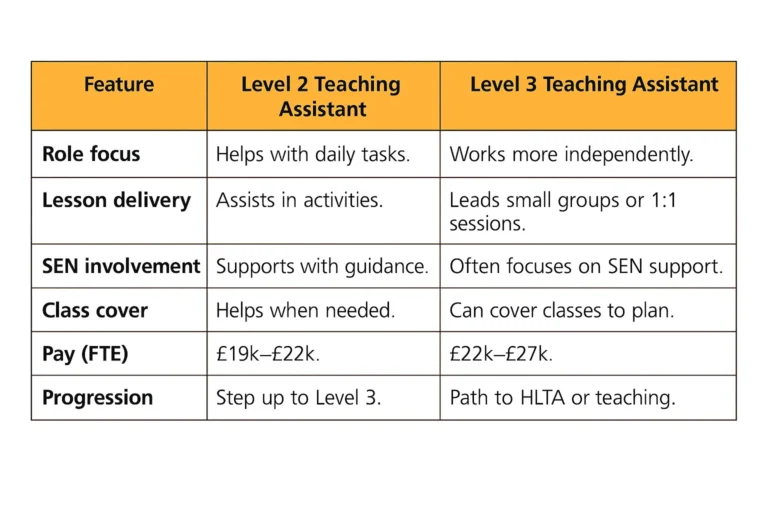What is a level 3 teaching assistant? A Level 3 Teaching Assistant helps children learn and do well in school. They have more responsibility than a Level 2 TA. They can plan and lead small group or one-to-one lessons. They also cover classes when the teacher is away by using the teacher’s plan. Many Level 3 TAs support children with special educational needs (SEN). Some also help and guide new teaching assistants.
This role is just below a Higher Level Teaching Assistant (HLTA). It is a great step for people who want to become teachers in the future. If you enjoy helping children and want to make a real difference every day, a Level 3 Teaching Assistant job is a wonderful choice.
In this article, we’ll explore what a Level 3 Teaching Assistant is and what they do in schools. You’ll learn how this role is different from Level 2, what skills and training you need, and what makes it such a rewarding career. We’ll also look at the duties, pay and next steps for anyone hoping to move into teaching. By the end, you’ll understand what being a Level 3 Teaching Assistant means and how to get there.
What Is a Level 3 Teaching Assistant?
A Level 3 Teaching Assistant is an experienced school worker who helps pupils learn and grow. They can work on their own more than a Level 2 assistant.
They often plan and lead small group or one-to-one lessons. They also help pupils with special educational needs (SEN) and cover classes when the teacher is away, using the teacher’s plan. Level 3 TAs also watch pupils’ progress and share updates with the teacher.
To become a Level 3 Teaching Assistant, you need an enhanced DBS check, safeguarding training, and a Level 3 Certificate or Diploma in Supporting Teaching and Learning (RQF). You also need some classroom experience to understand how to support pupils well.
Most jobs are term-time only, about 38 to 39 weeks a year. Pay depends on local council grades. Level 3 is just below the Higher Level Teaching Assistant (HLTA) role, but it is a great step if you want to move forward or train as a teacher.
Understanding Teaching Assistant Levels in the UK

In the UK, teaching assistants work at different levels — Level 1, Level 2, Level 3, and HLTA. Each level brings more responsibility, independence, and pay. It’s like climbing a ladder where each step helps you grow in your career.
Here’s a simple look at each level:
Level 1 Teaching Assistant
- Helps the teacher with basic classroom tasks.
- Prepares learning materials and tidies up after lessons.
- Supports pupils who need extra help.
- A great starting point for beginners.
Level 2 Teaching Assistant
- Works with small groups or one-to-one with pupils.
- Supports learning, reading, and behaviour management.
- Helps plan simple classroom activities.
- Builds confidence and skills for higher levels.
Level 3 Teaching Assistant
- Plans and leads small-group or one-to-one sessions.
- Supports pupils with special educational needs (SEN).
- Covers classes using the teacher’s plan.
- Guides new teaching assistants and tracks pupil progress.
Higher Level Teaching Assistant (HLTA)
- Leads full lessons and supports teachers across subjects.
- Takes on more leadership duties in the classroom.
- Works more independently and helps manage other TAs.
So, when you compare a Level 3 vs Level 2 Teaching Assistant, Level 3 gives more freedom, skill growth, and better pay. It’s a strong step toward becoming an HLTA or even a teacher one day.
What Does a Level 3 Teaching Assistant Do?
A Level 3 Teaching Assistant has an important job in the classroom. They help children learn, grow, and feel confident every day. They also support the teacher and make lessons run smoothly.
Here’s what they do:
- Lead small groups or one-to-one lessons in reading, phonics, or maths.
- Help children with special educational needs and change activities to suit them.
- Plan and prepare lessons with the teacher so everyone can join in.
- Keep the classroom calm and positive with simple rules and routines.
- Look after the class for short times when the teacher is away.
- Check how children are doing, write down progress, and share it with the teacher.
- Support and guide other teaching assistants when needed.
In short, a Level 3 Teaching Assistant makes a big difference. They help pupils learn in a kind, caring, and organised way every day.
What Qualifications Do You Need for Level 3?
To become a Level 3 Teaching Assistant, you need some key skills and training. The good news is, it’s not hard to get started.
Here’s what you need:
- A Level 3 Certificate or Diploma in Supporting Teaching and Learning (RQF) or a similar course.
- GCSE English and Maths at grade 4 (C) or higher, or Functional Skills if you don’t have GCSEs.
- An enhanced DBS check to show you can work safely with children.
- Level 3 Designated Safeguarding Lead Training Course and KCSIE training to help keep pupils safe.
- Some classroom experience. Many people do Level 2 first, but you can start Level 3 if you already have experience.
A Level 3 Teaching Assistant course helps you learn new skills, gain confidence, and move forward in your career. It’s a big step toward making a real difference in the classroom.
Skills You’ll Gain at Level 3
When you study a Level 3 Teaching Assistant course, you learn many useful skills that help you in the classroom every day. These skills make you more confident and ready to support both pupils and teachers.
Here’s what you’ll gain:
- Classroom management skills to keep lessons calm and positive.
- The ability to plan and lead short learning sessions with small groups or one-to-one.
- Diploma in Special Education Needs, like using pictures, breaking tasks into steps, and giving short breaks when needed.
- Assessment skills, such as watching pupils’ progress, writing notes, and planning next steps.
- Professional communication skills to work well with teachers, parents, and carers.
With these skills, you’ll be able to handle challenges with confidence, build strong relationships, and help every pupil reach their best potential.
Level 2 vs Level 3 Teaching Assistant: What’s the Difference?
Both Level 2 and Level 3 teaching assistants play key roles in the classroom. However, their duties, skills, and pay are not the same.
Here’s a quick and simple look at how they differ:

How Long Does It Take to Qualify as a Level 3 TA?
Becoming a Level 3 teaching assistant doesn’t happen overnight, but it’s not a long journey either. Most people finish their Level 3 course in about 6 to 12 months.
Many learners choose online or part-time study, which means you can learn while you work or volunteer in a school. You’ll complete short assignments, collect evidence from your classroom experience, and show your skills in real-life situations.
It takes effort and patience, but every week you’ll feel yourself growing more confident and capable in your role.
How Much Does a Level 3 Teaching Assistant Earn?
Let’s talk about money — because your hard work deserves fair pay! The average Level 3 teaching assistant salary is usually between £22,000 and £27,000 a year for full-time work.
However, most teaching assistants work term-time only, so your take-home pay is often around £14,000 to £18,000, depending on your hours and school weeks. Pay can also change based on where you live and work. For example, schools in London or big cities often pay a bit more. If you take on SEN support or HLTA-level duties, you may also earn a higher rate. It’s not just about the money, though — it’s about making a difference every single day.
Career Progression After Level 3
After Level 3, many new paths open for you. You already have great skills, so it’s time to grow more. You can become a Higher Level Teaching Assistant (HLTA). In this role, you lead lessons and follow the teacher’s plans.
You can also choose to work as a SEN specialist. This means helping children with autism, speech needs, or learning and behaviour challenges. Some people move into pastoral or mentoring roles. They support pupils with behaviour, confidence, or emotional wellbeing.
If you dream of becoming a teacher, you can go for teacher training. Courses like PGCE or School Direct help you take that step. Each role helps you learn more and make a bigger difference in children’s lives.
Is Level 3 Right for You?
Thinking about taking the next step in your teaching assistant career? Level 3 could be the perfect choice. It offers more freedom, fresh challenges, and stronger rewards.
Here’s why Level 3 might be a good fit:
- Enjoys helping children learn and grow every day.
- Ready to lead small groups or one-to-one sessions.
- Wants more independence and responsibility in the classroom.
- Feels passionate about supporting children with special needs (SEN).
- Has gained confidence at Level 2 and is ready to progress.
- Looks for better pay and clear career growth.
Level 3 opens the door to greater opportunities, helping you grow both professionally and personally while making a real difference in young lives.
Final Thoughts: Why Level 3 TAs Are Essential in Schools
Level 3 Teaching Assistants play a key role in every school. They bridge the gap between teachers and pupils, helping learning flow smoothly each day.
Their support helps children stay focused, understand lessons, and build confidence. They also bring calm, care, and creativity to classrooms—making a real difference in how pupils learn and feel.
Schools depend on their skills, patience, and teamwork. Without them, many children would struggle to get the extra help they need. Level 3 TAs truly are the heart of learning support, helping both teachers and pupils succeed together.
FAQs: What Is a Level 3 Teaching Assistant?
- Can a level 3 TA teach a class?
No, a Level 3 Teaching Assistant can’t teach a full class alone. They can only cover lessons under a teacher’s plan.
- What is the next step up from a level 3 TA?
The next step after Level 3 is the Level 4 Certificate in Education and Training. It helps you move closer to becoming a qualified teacher.
- Can you work in a nursery with a level 3 teaching assistant?
Yes, with a Level 3 Teaching Assistant qualification, you can work in a nursery. It can also lead to higher roles like nursery practitioner or room leader.
- What is the role of a Level 3 teaching assistant?
A Level 3 Teaching Assistant helps teachers, supports students in lessons, and leads small group or one-to-one learning.
- Is being a TA a good job?
Being a TA is a great job for caring people who enjoy helping children learn, though it’s not the highest-paid role.




